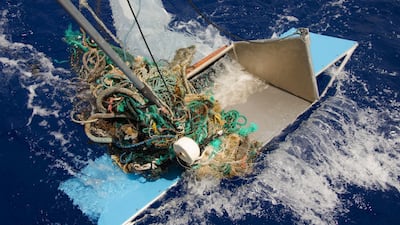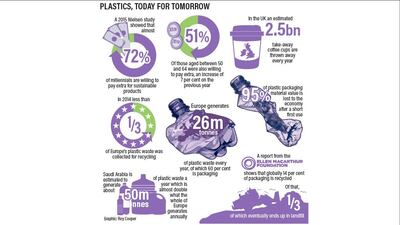The p-word. Once hailed as a wonder product, plastic is now increasingly regarded as one of nature's biggest villains and deadliest menaces.
When production costs were slashed, this durable material secured a foothold in almost every aspect of daily life. Flimsy paper grocery bags were replaced by colourful, durable plastic bags. Couples held Tupperware parties, where guests brought dishes to dinner parties in plastic containers. Flashy advertisements for lighter, shatterproof plastic bottles of fizzy drinks flashed across televisions as their glass counterparts were consigned to the store room.
This growth has had unimagined consequences. Waste during production and a failure to look after plastic products once consumers are finished with them have been inimical to the planet.
These plastic bags, containers and bottles now choke our oceans. An estimated five trillion pieces of plastic are floating in our waters. By 2050, it is predicted, there will be more plastic than fish in the oceans, by weight. We know the stomachs of birds and marine mammals are being fatally clogged up with man-made detritus. A third of coral reefs are entangled with plastic, which increases the risk of disease breaking out by 20 times.
Microplastics from degrading rubbish are being ingested by fish that end up on dinner plates. Images of coastlines littered with junk and animals strangled by plastic debris fill media reports.
“I think we have reached the point where we can definitely call it a crisis,” says Dr Nanne van Hoytema, scientific research co-ordinator for By The Ocean We Unite, a Dutch foundation set up to prevent more plastics entering the oceans.
“Many places that we collectively view as paradise, like Bali and places in the Pacific, are now completely swamped in plastic waste.
“Because we are producing more and more litter this will only increase, as well as any negative effects on marine life and the oceans,” says the former coral reef researcher.
Dr van Hoytema says that as more research is done, the extent of the problem is revealed.
“We are finding plastic bits everywhere,” he says, citing the findings in January of microplastics, plastics which are less than 5 millimetres wide, in the Antarctic marine system.
The expeditions carried out by By The Ocean We Unite in the North Sea regularly find plastics in waters that are a three-day sail from land. The foundation sometimes escorts members of the public on these trips. It "opens their eyes" Dr van Hoytema says, and people become more aware of "how inundated we are with plastics" once they have seen it for themselves.
Dr van Hoytema believes the problem boils down to human carelessness. The longer that continues, he says, the harder it will be to remedy the effect the pollution has had.
But not all scientists are convinced oceans are in such a rotten state. Dr Erik van Sebille, an oceanographer at Utrecht University, is more cautious.
“It’s not nearly as bad as many other people think,” he says, reflecting that he is only now slowly considering that the oceans could be at a breaking point.
Crisis, he says, will be when evidence of ecosystem-wide damage is found, rather than anecdotal individual incidents – no matter how moving those can be.
“There is a lot of plastic in the ocean and it’s an atrocity. We should be ashamed of ourselves as humanity. There is so much plastic, but the fact is it’s been really hard for biologists to show that plastic actually harms ecosystems.
“We found that birds, fish, oysters, individual animals are being killed by plastic, but if it really has a fundamental and existential harm on ecosystems is very difficult to show.”
But more studies point to wider damage. Dr van Sebille highlights a study that found plastic is making coral reefs sicker and another that found female oysters exposed to microplastics made 38 per cent fewer eggs, and males produced sperm that were 23 per cent slower.
_______________
Read more:
Exclusive: Gulf states consider zero landfill target for plastics by 2040
Five tips on how to live a plastic-free life in the UAE
UAE scientists concerned about 'catastrophic' plastic use across the globe
_______________
A project he worked on revealed that litter was travelling faster than expected towards the Arctic.
By tracking GPS signals from 20,000 buoys, which mimic plastic in the ocean, the researchers were able to create a model of the surface pathways of the oceans.
Their extrapolation was confirmed when scientists travelled and saw for themselves how much plastic had drifted to the Arctic.
There is no easy fix.
The usefulness of plastics is arguably the biggest challenge of all, says Dr van Sebille.
"There are a lot of very good uses of plastic but it just doesn't belong in the environment," he says. Plastic has innumerable opportunities to escape into nature, either through sewerage, littering, and poor waste management.
“The production of plastic [causes] leaks into the environment and it means that there is no one single way to plug the system.
"There is no silver bullet to solve the problem and that makes it hard," Dr van Sebille says.


